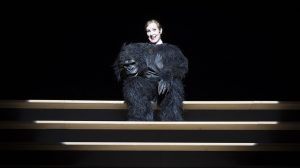Not one for the traditionalists, Barrie Kosky’s directorial reimagining of Bizet’s classic Carmen pushes the boundaries of what it means to stage a traditional opera within a historical venue in the modern day.

The curtain rises to reveal a neutral setting: a vast set of stairs that fill the entirety of the stage, which remain throughout the production. Carmen’s well known entrance aria, Habanera, bizarrely introduces the protagonist in a gorilla suit, from which she undresses herself throughout the song to reveal an androgynous appearance. This gender-neutral image conflicts with the traditionally sexualised, feminine portrayal of the character, and it is not until the second act that we see Carmen in more typically feminine, 1930s inspired attire.
Gender stereotypes are challenged throughout the production; men dance seductively with other men, women gaze at Carmen with the same lustful adoration as the men, and the heartthrob matador, Escamillo, is unashamedly camp and narcissistic.
The use of a prerecorded voiceover of Carmen’s narration, in place of the dialogue and recitative of the original, serves a purpose to focus the attention upon her throughout, though often jars with the flow and focus of the onstage action. Once again, this convention tests the audience’s expectations of what is considered as acceptable within the space of the Opera House. Similarly, Otto Pichler’s vaudeville-inspired choreography showcases sections of wonderfully synchronised, energetic dance with frequent references to modern moves familiar almost exclusively to a younger generation, from the Macarena to the ‘Backpack Kid’ arm dance. While these inclusions adhere to the forward- thinking notion of the production, they are at times distracting from the vocal performances and occasionally deduct more than they offer.
The captivating energy and sheer vocal power of the Chorus is apparent throughout, particularly in the well known ‘a deux cuartos’, with unison jumping, clapping and fist- pumping producing a powerful display both visually and audibly. However, the infectious energy that they produce falls on deaf ears, and it is difficult to ignore the significantly fewer audience members ready for the third act following the interval. Many of the modern-day references receive a similarly poor reception; an ensemble member dragging out a hysterical laugh to within an inch of its life entices one audience member to shout out, ‘think he’s laughing at the director’. More surprising still, the heckler is not hushed, but is supported by other audience members laughing in agreement to his statement. Certainly something I never expected to experience at the Opera House, but proof that the production is not one to please all.
The vocal ability and strength of the lead roles is undeniable, with a particularly notable performance by Kristina Mkhitaryan in her stunning rendition of Micaëla’s aria, je dis que rien ne m’épouvante. Her physical vulnerability staged alone amongst the vastness of the stairs intensifies her solo vocal control and emotional integrity, which fills the space with faultless conviction. Jakub Hruša’s orchestra plays the Bizet score with passion and precision, complementing the confident, moving vocal performances delivered by the leads throughout.
Much like Emma Rice’s directorial adaptation of Imogen at the Globe, Kosky’s Carmen divides the audience like Marmite. Kosky’s production is one that I encourage younger audiences and those unfamiliar to the art form to see and decide upon for themselves. Opera needs these sorts of inventive, exciting, and daring productions to encourage and entice a new wave of audiences to engage in its performances. 4/5
Review written by Zoë Mace.
Carmen is currently showing until Friday 16th March 2018 at the Royal Opera House. To find out more about the production, visit here…


Leave a Comment